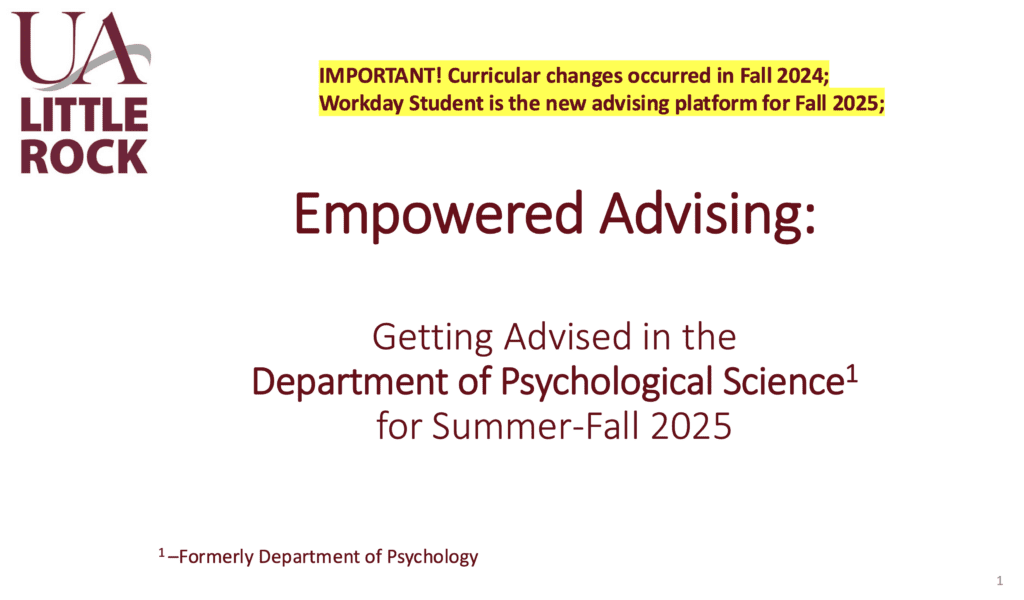Regular Advising Season will open March 12, 2025, and continue through May 5, 2025.
Late Advising Season will open May 15, 2025.
NOTICE: Advising for summer and fall will occur simultaneously. That means students must include both summer and fall classes on their form. If a student only plans to take summer courses because they are graduating at the end of summer, there should be a note on the eForm, or it may be sent back for correction.
Students are encouraged to be advised early because advising will employ two systems: Class Search and BOSS will be used for summer advising and Workday Student will be used for Fall. Fall classes are embedded in Workday Student. Students must have activated and prepared their Workday Student account before the advising meeting. The advising appointment may be canceled if the account has not been activated.
Please verify that there are seats available in the courses you select. If not, please indicate whether you will join a waitlist. Also, consider listing alternative courses in case you do not get a seat in your preferred course. If so, please indicate in the notes which courses you are considering as alternatives.
The drop-down menu and headings below will guide students through the steps of the advising process.
Advising Process
The goal should be to finish the core curriculum as soon as possible, so you can incorporate courses for the minor and foreign language sequence as you work your way through the major.
Freshman Year
Concentrate on completing core curriculum courses.
Before you can take your first psychology class, PSYC 2300 Psychology and the Human Experience, you must first finish RHET 1311 Composition I.
Be sure to take MATH 1302 College Algebra (or MATH 1321) and earn a C or better. This is a prerequisite for PSYC 3435 Statistics and Methods I.
Sophomore Year
Once you complete RHET 1311 and MATH 1302 (or MATH 1321), take PSYC 2300. In your second semester, you are ready to take PSYC 3435 Statistics & Methods I and PSYC 3320 Applied Psychology. Start working on your foreign language sequence courses and choose a minor.
Junior Year
The following will ensure you are prepared for your senior year.
Plan to take:
- PSYC 3435 Statistics & Methods I (If you have not already.)
- PSYC 3441 Research Methods
One course from the following:
- PSYC 3350 Social Psychology
- PSYC 3360 Abnormal Psychology
- PSYC 3330 Health Psychology
One course from the following:
- PSYC 3370 Industrial Psychology
- PSYC 3375 Consumer Psychology
- PSYC 4325 Personnel Psychology
- PSYC 4363 Organizational Psychology
One course from the following:
- PSYC 3305 Sensation and Perception
- PSYC 3380 Cognitive Psychology
- PSYC 4320 Physiological Psychology
- PSYC 4300 Learning and Memory
Senior Year
Plan to take:
- 3 upper-level course electives
- PSYC 4492 Capstone
Step 1: How to Get Advised
Below is a guide for the advising process. It may be opened in a browser or downloaded. Please note that advising for summer and fall 2025 is different than previously.

Step 2: Scheduling an Appointment
Schedule an advising appointment for both summer and fall with a faculty member from the list below. If the preferred faculty member is not available, please choose another option on the list.
Please remember to check your @ualr email account for the confirmation email.
If you have not received a Calendly confirmation please reach out to Dr. Sherwin immediately.
If none of the advisors listed have appointments available, email Dr. Sherwin, Department Chair.
Step 3: Complete and Submit the Course Selection eForm
Please review the flow chart to ensure your Course Selection eForm is submitted by the day and time, or the appointment may be canceled.
For summer classes, please use this link to find your courses: https://a.ualr.edu/classes/
Reminder: Fall classes are listed in Workday Student.
Note: If the advising appointment is canceled, for any reason, the Course Selection eForm must be re-submitted. The form must be resubmitted even if the appointment is with the same advisor.
